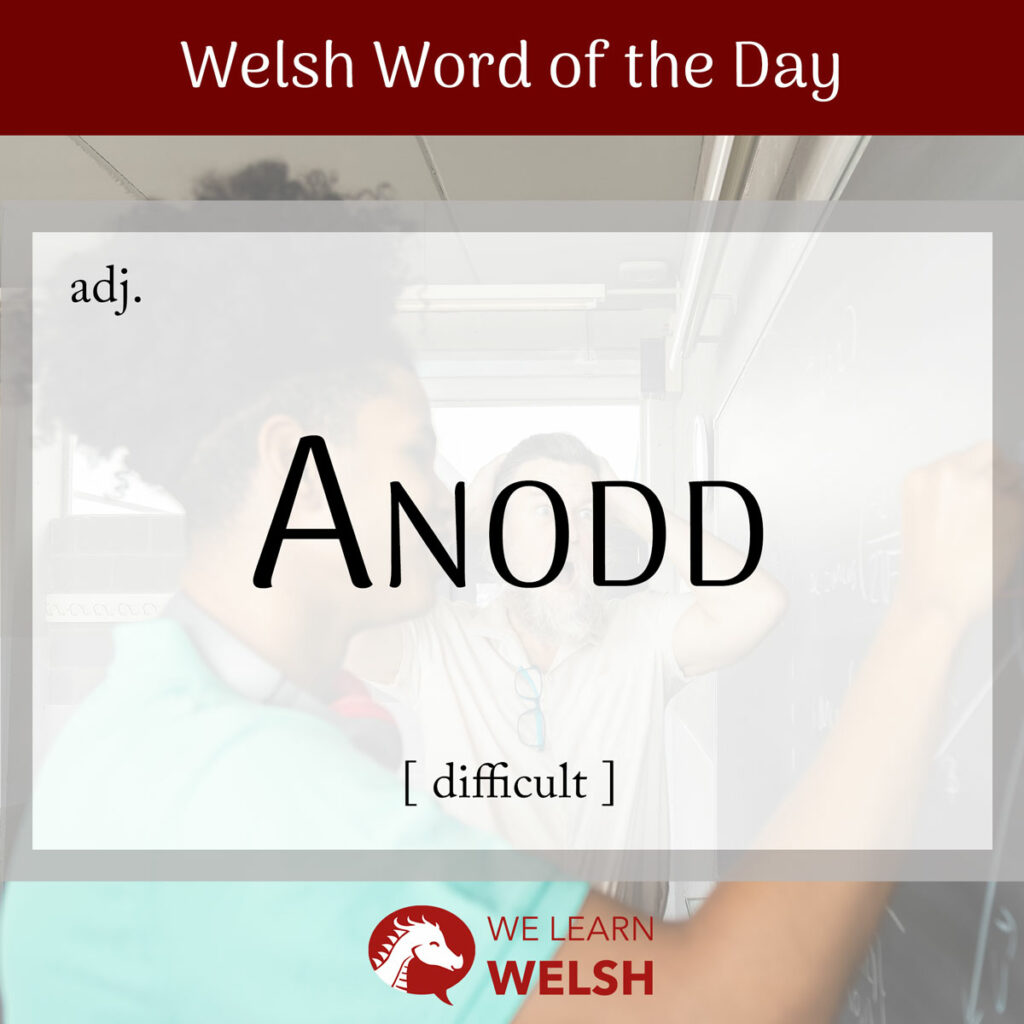A few months ago, we published an article about the Welsh word hawdd (easy). I’m sure many of you read that article and thought the word anodd (difficult) would be much more relevant to your everyday life!
anodd
difficult
Most likely, it originally comes from the word hawdd itself, with a negative prefix added to the beginning of it to show that it’s an antonym – anhawdd. More evidence for this theory is the fact that the word anhawdd does itself exist, and is the older form of the word, even though it’s not used very much today.
In a way, anhawdd persists in some variant forms of anodd. For example, more difficult can be translated as either anoddach, anhaws, or anos. Most difficult is anoddaf or anhawsaf. To say as difficult as, you can go for cyn anhawsed â or cyn anodded â. In general, the forms that sound most like anodd itself are the more colloquial, casual forms, and literary and formal writing will feature the versions that honour the original structure of the word.
Another example of the persistence of this word’s original form is that a difficulty in Welsh is anhawster. Or, you can keep it very simple and just say peth anodd (a difficult thing)!
It’s not just anodd and anhawdd though – you can also describe something as astrus (complicated / obscure), trafferthus (laborious), or even caled (hard), which, like in English, is used both to describe something physically hard, and something that is difficult.
Anodd i neidr anghofio sut i frathu.
A leopard doesn’t change its spots.
(literally: It’s difficult for a snake to forget how to bite).
We all find different things hard. I’m shockingly bad at some things I think most people would consider to be very rhwydd (a synonym of hawdd, easy). For example, I really struggle to laso fy esgidiau (tie my shoelaces). At the age of twenty-three, I’m not sure how common that one is…
Some things that it might be more normal to find anodd include:
- sefyll arholiad = sitting an exam
- datrys hafaliadau = solving equations
- dringo mynydd = climbing a mountain
- rhedeg marathon = running a marathon
- torri record y byd = breaking a world record
- dysgu gyrru = learning to drive
- dysgu iaith newydd = learning a new language

But realistically, anhawster is something very personal. What one person thinks is gwaith go anodd (really difficult work), another may think is hawdd fel dŵr (easy like water, a bit like easy-peasy). My wife has no problem helping me with my laso, but makes me write all her e-bostiau (emails) for her!
Lots of people balk at taking on tasgau (tasks) that they initially find difficult, protesting that mae’n anodd dysgu hen gostog (it’s hard to teach an old watchdog, the equivalent of you can’t teach an old dog new tricks). You may be aware of what you need to do to get something done – but nid y gwybod sy’n anodd ond y gwneud (it’s not knowing that’s hard but doing).
What’s important is ensuring that your dulliau (methods) are appropriate for the task at hand. After all, mae’n anodd torri cwlwm â gordd (it’s hard to break a knot with a hammer). This proverb is especially true when it comes to learning a new language, where selecting the right methods that suit your personal learning style is absolutely essential.
Mae’n anodd credu ei bod hi’n dal i garu o.
It’s hard to believe that she still loves him.
Cwestiwn anodd ei ateb (a difficult question to answer) is what the anhawsaf element of learning Welsh is. A lot of people are initially put off by the unique letters and sounds, whereas more experienced learners often ymboeni (agonise) over treigladau (mutations). The gap between the literary and the colloquial iaith (language), as well as between different dialects, also presents challenges.
But I believe in you to push through all of that! There are more learners and resources available than ever before, and if you’re reading these erthyglau (articles), it means you’re already taking steps every day to make y Gymraeg less anodd than it was the day before.
What do you find most anodd about learning Welsh? Let us know in our friendly Facebook group!

